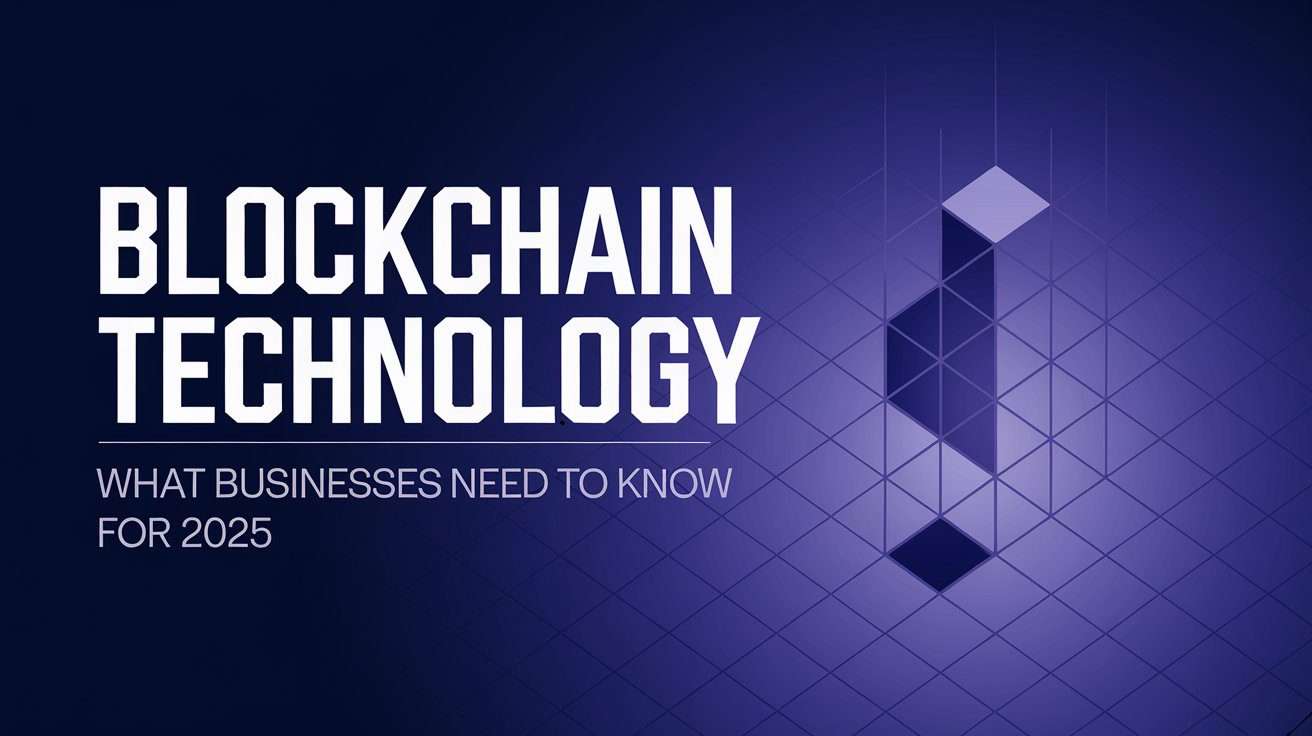Blockchain technology is no longer just a buzzword in tech; it’s transforming industries across the board, from finance to supply chain management, healthcare, and beyond. As we approach 2025, understanding the benefits, challenges, and future potential of blockchain is essential for businesses looking to stay competitive. In this article, we’ll explore the core aspects of blockchain technology, its real-world applications, and the trends businesses should watch to navigate this evolving landscape effectively.
Understanding Blockchain and Its Business Benefits

Blockchain Technology is a decentralized ledger system that securely records transactions across multiple computers, making it virtually tamper-proof. For businesses, it offers various advantages that can streamline operations and enhance security.
Enhancing Transparency and Trust
One of the main attractions of blockchain for businesses is its transparency. Transactions are recorded in a way that’s visible to all authorized participants, allowing for an unprecedented level of accountability. For example, a business that uses blockchain for supply chain management can trace each step in the process, ensuring that goods are sourced ethically and reducing the chance of fraud.
Improving Data Security
Data security is a critical issue for businesses in today’s digital age. Blockchain’s encryption and decentralized nature make it inherently secure, as each block in the chain contains a unique code (or “hash”) that links it to the previous one, making unauthorized changes nearly impossible. For companies dealing with sensitive information, such as financial data or customer records, blockchain can provide a safer alternative to traditional databases.
Reducing Operational Costs
By eliminating intermediaries, blockchain can help businesses cut down on costs. Traditional financial transactions often require third-party involvement, which adds fees and delays. With blockchain, transactions can occur directly between parties, reducing overheads. For instance, a business could save on cross-border transaction fees and achieve faster payment processing times by using blockchain-based solutions.
Key Applications of Blockchain in Business

In the Blockchain Technology, Blockchain’s applications go far beyond cryptocurrency. Businesses are finding innovative ways to leverage the technology across various industries to improve efficiency, transparency, and customer trust.
Supply Chain Management and Product Tracking
Blockchain’s transparency is a game-changer for supply chain management. Businesses can track products in real time, from the point of origin to the final destination, creating an unbroken trail of data. This visibility helps companies identify and address bottlenecks and reduces the risk of counterfeit goods. For example, a food company could use blockchain to trace produce back to its source in the event of a contamination issue, improving safety and customer confidence.
Smart Contracts for Streamlined Transactions
Smart contracts are self-executing contracts with the terms directly written into code on the blockchain. They enable automated, secure, and enforceable agreements without the need for intermediaries. Businesses are increasingly using smart contracts for tasks like lease agreements, insurance claims, and supplier payments. By automating these processes, companies can save time and reduce errors, making transactions faster and more reliable.
Decentralized Finance (DeFi) Opportunities
DeFi, or decentralized finance, is an emerging field that uses blockchain to create financial products outside traditional banking systems. For businesses, DeFi presents an opportunity to access new financial services, such as decentralized lending, borrowing, and investment options. Small businesses, in particular, could benefit from DeFi by bypassing traditional financial institutions and gaining easier access to capital, expanding opportunities in previously inaccessible markets.
Trends in Blockchain Technology to Watch by 2025

Blockchain Technology is constantly evolving, and staying updated on the latest trends is crucial for businesses looking to leverage its potential. Here are some key trends that are likely to shape blockchain’s future over the next few years.
Integration with the Internet of Things (IoT)
IoT devices are everywhere, from smart home appliances to industrial equipment. When combined with blockchain, IoT can create a secure, interconnected network where devices can communicate and transfer data autonomously. For example, a factory could use blockchain-enabled IoT devices to track machine maintenance, automatically triggering repairs when needed. This integration can reduce downtime, improve operational efficiency, and increase data accuracy across industries.
Growing Use of Tokenization in Business Models
Tokenization involves converting assets into digital tokens on the blockchain, representing ownership or access rights. This trend is gaining traction in various sectors, from real estate to intellectual property. For instance, a real estate developer could tokenize property shares, allowing investors to purchase fractional ownership of a building. This approach provides more flexibility, as it lowers entry barriers and makes investments more accessible to a broader audience.
Blockchain Interoperability Between Networks
With multiple blockchain networks operating independently, interoperability—the ability of different blockchains to interact—is becoming increasingly important. In the near future, businesses may need to operate across various blockchain networks seamlessly. Blockchain interoperability could allow smoother data transfers and collaborations, enhancing efficiency in areas such as logistics and healthcare. For example, a hospital could share a patient’s records across multiple healthcare providers using interconnected blockchain networks, ensuring a secure, unified medical history.
Preparing for Blockchain Adoption: What Businesses Need to Consider

Blockchain Technology offers tremendous potential, but businesses should weigh several factors to determine if, when, and how to implement it in their operations.
Evaluating Business Needs and Feasibility
Blockchain isn’t a one-size-fits-all solution. It’s essential for businesses to assess their specific needs and determine whether blockchain is the best fit. While it offers powerful benefits, implementing blockchain can be costly and complex, so the potential return on investment (ROI) must justify these expenses. Conducting a detailed feasibility study can help businesses weigh the costs, benefits, and long-term impacts of integrating blockchain.
Understanding Regulatory and Compliance Challenges
Blockchain operates in a somewhat ambiguous regulatory environment, as many governments and financial institutions are still establishing rules around its use. Businesses need to stay updated on relevant regulations, especially when using blockchain for financial transactions or data management. Compliance with data privacy laws, such as GDPR, is crucial to avoid legal complications. For instance, companies dealing with personal customer data on the blockchain must ensure data privacy, a challenge given blockchain’s immutable nature.
Building Internal Expertise and Partnerships
Blockchain is a complex technology, and businesses may lack in-house expertise to implement it effectively. Investing in staff training or hiring professionals with blockchain knowledge can be beneficial. Alternatively, forming partnerships with specialized blockchain firms or tech consultants can ease the adoption process. For example, a retail business could collaborate with a blockchain logistics provider to introduce blockchain tracking in its supply chain without needing to develop the infrastructure internally.
Challenges and Limitations of Blockchain Technology

While blockchain and Blockchain Technology offers many advantages, it’s not without its challenges. Understanding these limitations can help businesses make informed decisions and avoid potential pitfalls.
Scalability Issues in Large-Scale Applications
One of blockchain’s biggest challenges is scalability, as networks can become slow and costly as transaction volume grows. For businesses that rely on processing a large number of transactions quickly, like payment services, blockchain may currently fall short. However, solutions such as layer-two protocols and sharding are being developed to improve scalability. It’s essential for businesses to be aware of these limitations and evaluate whether current blockchain technology can support their needs.
High Energy Consumption and Environmental Impact
Blockchain, especially proof-of-work systems like Bitcoin, requires significant energy to maintain. This high consumption has raised environmental concerns, which can conflict with sustainability goals. Businesses with strong environmental commitments may need to consider alternative blockchain models, such as proof-of-stake, which have a lower energy footprint. Understanding the environmental impact of different blockchain models can help companies choose the most suitable and responsible option.
Complexity and Cost of Implementation
Blockchain is not easy or inexpensive to implement. The initial investment in infrastructure, along with the need for skilled professionals, can be substantial. For smaller businesses, these costs may outweigh the benefits. However, as the technology advances, solutions are becoming more affordable and accessible. In the meantime, businesses should carefully consider whether they have the resources to make blockchain implementation feasible.
Conclusion
Blockchain technology is set to play a significant role in the future of business, but success requires careful planning, an understanding of emerging trends, and the flexibility to adapt as the technology evolves. As we move toward 2025, companies that stay informed and proactive about blockchain’s potential will be better positioned to leverage its benefits and overcome its challenges. By building transparency, improving security, and streamlining operations, blockchain offers a transformative path forward for businesses ready to embrace its potential.

